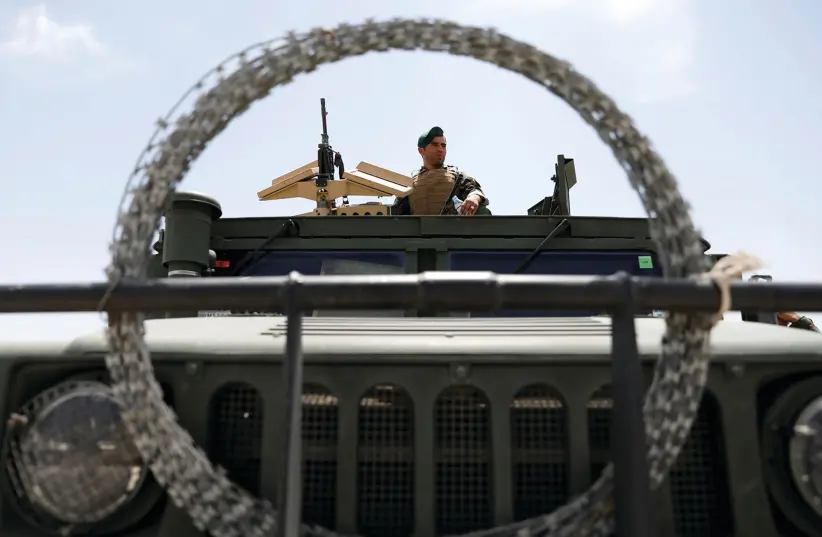Afghanistan killed war for democracy, but war on jihadism lives on

MIDDLE ISRAEL: The war on Islamism, unlike the war for democracy, is both winnable and imperative.
They had – to paraphrase Joe Biden – the will to fight.
Faced with 200,000 Soviet troops and 5,000 tanks, Hungarian workers and students confronted their Soviet invaders with hunting rifles, pistols and Molotov cocktails as Budapest became a battlefield between David and Goliath.
Thousands were killed in one of the most gallant wars anyone ever fought for liberty, inspired by the rebel government’s decisions to shed the one-party system, hold free elections, and leave the Warsaw Pact. The Hungarian Revolt thus begged for Western support, which according to a Radio Free Europe report was indeed on its way.
That support never came. The one weapon the rebels brought, the will to fight, was the one weapon that the Western powers, led by Biden’s predecessor Dwight Eisenhower, did not possess.
It was the perfect inversion of this century’s Afghan situation, as articulated by Biden in his tragic apologia Monday. This time around America had the will to fight, and the ones who lacked it were its clients.
The Afghan people will now come under the yoke of the regime they failed to fight. The West, at the same time, will have to rethink the concept of “global war.”
THE WILL to fight is any war’s key element.
Germany’s defeat in Stalingrad stemmed in part from its deployment of 350,000 Romanian and Italian troops – about one third of the Axis armies in that theater – many of whom lacked the Germans’ will to fight.
Yes, the will to fight is difficult to gauge. In an IDF briefing I once attended, an intelligence colonel said German intelligence was once briefing Adolf Hitler about prewar France’s army, and after telling him all about that superpower’s tanks, planes, warships, artillery, manpower and fortifications, Hitler said: “Yes, but they don’t want to fight.” Subsequent events vindicated him.
The difficulty in detecting someone else’s willingness to fight goes both ways. Just like American presidents overestimated the Afghan Army’s motivation, Egyptian president Gamal Abdel Nasser underestimated, in 1967, Israel’s will to fight, a misjudgment later repeated by Yasser Arafat.
Surely, the will to fight is an insufficient condition for victory. That is what the Hungarians learned in 1956 and what the Finns learned in 1940, when they bravely fought their own Soviet invaders.
This is all besides the fact that the will to fight is itself complex. The rebels of the 1968 Spring of Prague had the will to fight, but only politically and culturally, as demonstrators, dissidents, and prisoners of conscience. As fighters, they avoided the kind of wholesale violence that Budapest saw in 1956.
It follows that before planning on foreign partners to join their wars, superpowers must consider what those partners are prepared to fight for and at what price. That is what the US didn’t do in Afghanistan, and that is what it must do in fighting the only cause that right now allows, and begs, a global war.
THE AFGHAN majority refused to fight the Taliban, a strategic surprise that must lead to two painful conclusions. The first is cartographic. Western policymakers’ assumption that every country mapped in the atlas can become a workable polity has proved unfounded in recent decades, time after time.
Countries like Syria, Libya, Yemen, Iraq and Afghanistan are so arbitrarily mapped and socially disjointed that critical masses of their citizens don’t identify with them. Such republics’ histories, anthems and flags mean to millions of their citizens a lot less than their sectarian identities. No amount of imperial money will make them sacrifice, let alone die, for the artificial countries that emerged around their tribes, faiths and sects.
The second lesson is that we Westerners were wrong in our assumptions about freedom’s place in history. We were wrong to assume that everyone wants freedom, that everyone understands freedom the same way, that everyone is prepared to fight for freedom, that freedom’s march is predestined, and that freedom’s victory is foretold.
By the same token, American leaders were wrong to assume that “nation building” can be a diplomatic goal; not because nations can’t be built, but because nations can’t be built by foreigners. Similarly, freedom cannot be imposed from above where it isn’t demanded from below.
That’s why the great democratic momentum unleashed by the fall of the Soviet Union and the communist idea has been stemmed, and followed by a great authoritarian reaction that began in China’s Tiananmen Square Massacre of 1989, then proceeded to post-democratic Russia, Turkey and Hungary, and this week climaxed in post-American Afghanistan.
Global freedom, in short, is on the defensive, and it’s on the defensive because not all people appreciate it the way we Westerners do. The West should of course continue helping freedom fighters wherever they may be, but its help can only reflect, not replace, distant nations’ will to fight.
That is not the case with the other cause, the original one, for which America landed in Afghanistan: the war on Islamist jihadism.
Islamism is the most effective, intense and global threat to peace since World War II, a scourge that compensates for its lack of warships, tanks and jets with the one elusive weapon it owns in abundance: the will to fight.
Islamism’s war is not on the West; having struck in Russia, China, Indonesia, Turkey and throughout Africa, its target is the entire human race. That is why the war on Islamism, unlike the war for democracy, is both winnable and imperative.
That’s why there will now be an unwritten agreement with Afghanistan’s new leaders: what happens between you and the Afghan people who failed to fight you is between you and them, but if you return to export jihadists, you will find that you too can underestimate other people’s will to fight.
